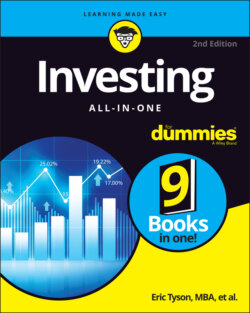Читать книгу Investing All-in-One For Dummies - Eric Tyson - Страница 28
Consider your time horizon
ОглавлениеInvestors who worry that the stock market may take a dive and take their money down with it need to consider the length of time that they plan to invest. In a one-year period in the stock and bond markets, a wide range of outcomes can occur (as shown in Figure 2-1). History shows that you lose money about once in every three years that you invest in the stock and bond markets. However, stock market investors have made money (sometimes substantial amounts) approximately two-thirds of the time over a one-year period. (Bond investors made money about two-thirds of the time, too, although they made a good deal less on average.)
© John Wiley & Sons, Inc.
FIGURE 2-1: What are the odds of making or losing money in the U.S. markets? In a single year, you win far more often (and bigger) with stocks than with bonds.
Although the stock market is more volatile than the bond market in the short term, stock market investors have earned far better long-term returns than bond investors have. (See the later section “Stock returns” for details.) Why? Because stock investors bear risks that bond investors don’t bear, and they can reasonably expect to be compensated for those risks. Remember, however, that bonds generally outperform a boring old bank account.
History has shown that the risk of a stock or bond market fall becomes less of a concern the longer that you plan to invest. Figure 2-2 shows that as the holding period for owning stocks increases from 1 year to 3 years to 5 years to 10 years and then to 20 years, there’s a greater likelihood of seeing stocks increase in value. In fact, over any 20-year time span, the U.S. stock market, as measured by the S&P 500 index of larger company stocks, has never lost money, even after you subtract the effects of inflation.
© John Wiley & Sons, Inc.
FIGURE 2-2: The longer you hold stocks, the more likely you are to make money.
Most stock market investors are concerned about the risk of losing money. Figure 2-2 clearly shows that the key to minimizing the probability that you’ll lose money in stocks is to hold them for the longer term. Don’t invest in stocks unless you plan to hold them for at least five years — and preferably a decade or longer. Check out Book 3 for more on using stocks as a long-term investment.
